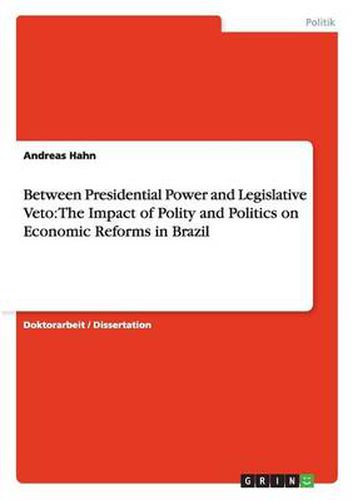Readings Newsletter
Become a Readings Member to make your shopping experience even easier.
Sign in or sign up for free!
You’re not far away from qualifying for FREE standard shipping within Australia
You’ve qualified for FREE standard shipping within Australia
The cart is loading…






Doktorarbeit / Dissertation aus dem Jahr 2013 im Fachbereich Politik - Politische Systeme - Allgemeines und Vergleiche, Universitat Duisburg-Essen, Sprache: Deutsch, Abstract: The pace and scope of the Brazilian economic development in the 1980s and 1990s is intrinsically linked to the wide-ranging discussion of political and economic reform projects. In the wake of the crisis of the import-substitution economic model a wide array of approaches and theories revolved around one basic question: When there occurs a crisis in the economy - whatever definition of crisis may be applied in a particular case - which are the best ways of overcoming anti-reform resistances, regain economic growth and promote sustainable and future-approved development? In the most general sense a crisis of the political or economic system can be referred to as two-dimensional: on the one hand it means the shattering and dis-equilibrating of a formerly successful status quo, on the other hand it opens up the necessity to find a new status quo (or status quo post) that can be deemed compatible to the new economic, domestic as well as international, circumstances. In fact, the longer a prosperous status quo lasts, the more difficult a subsequent change will get. Path-dependencies develop, stable institutions arise, group interests and organizations take root and expectations about growth, inflation, external trade and other variables cement into place.
$9.00 standard shipping within Australia
FREE standard shipping within Australia for orders over $100.00
Express & International shipping calculated at checkout
Doktorarbeit / Dissertation aus dem Jahr 2013 im Fachbereich Politik - Politische Systeme - Allgemeines und Vergleiche, Universitat Duisburg-Essen, Sprache: Deutsch, Abstract: The pace and scope of the Brazilian economic development in the 1980s and 1990s is intrinsically linked to the wide-ranging discussion of political and economic reform projects. In the wake of the crisis of the import-substitution economic model a wide array of approaches and theories revolved around one basic question: When there occurs a crisis in the economy - whatever definition of crisis may be applied in a particular case - which are the best ways of overcoming anti-reform resistances, regain economic growth and promote sustainable and future-approved development? In the most general sense a crisis of the political or economic system can be referred to as two-dimensional: on the one hand it means the shattering and dis-equilibrating of a formerly successful status quo, on the other hand it opens up the necessity to find a new status quo (or status quo post) that can be deemed compatible to the new economic, domestic as well as international, circumstances. In fact, the longer a prosperous status quo lasts, the more difficult a subsequent change will get. Path-dependencies develop, stable institutions arise, group interests and organizations take root and expectations about growth, inflation, external trade and other variables cement into place.